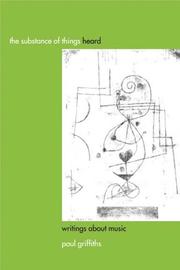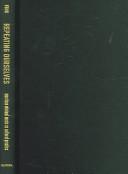| Listing 1 - 4 of 4 |
Sort by
|

ISBN: 1281608157 9786611608156 1580466486 1580462065 Year: 2005 Publisher: Rochester, NY : University of Rochester Press,
Abstract | Keywords | Export | Availability | Bookmark
 Loading...
Loading...Choose an application
- Reference Manager
- EndNote
- RefWorks (Direct export to RefWorks)
A choice selection of essays, reviews and interviews providing insights into musical performance, composition in the late 20th century and very early 21st, and the nature of opera. Paul Griffiths offers his own personal selection of some of his most substantial and imaginative articles and concert reviews from over three decades of indefatigable concertgoing around the world. He reports on premieres and other important performances of works by such composers as Elliott Carter, Sofia Gubaidulina, Karlheinz Stockhausen, and Steve Reich, as well as Harrison Birtwistle and other important British figures. Griffiths vividly conveys the vision, aura, and idiosyncrasies of prominent pianists, singers, and conductors (such as Herbert von Karajan), and debates changing styles of performing Monteverdi and Purcell. A particular delight is his response to the world of opera, including Debussy's 'Pelléas et Mélisande' (six contrasting productions), Pavarotti and Domingo in Verdi at New York's Metropolitan Opera, Schoenberg's 'Moses and Aaron', and two wildly different Jonathan Miller versions of Mozart's 'Don Giovanni'. From the author's preface: 'We cannot say what music is. Yet we are verbal creatures, and strive with words to cast a net around it, knowing most of this immaterial stuff will evade capture. The stories that follow cover a wide range of events over a period of great change. Yet the net's aim was always the same, to catch the substance of things heard. Criticism has to work largely by analogy and metaphor. This is no limitation. It is largely through such verbal ties that music is linked to other sorts of experience, not least the natural world and the orchestra of our feelings.' Paul Griffiths's reviews and articles have appeared extensively in both Britain ('Times, Financial Times, Times Literary Supplement') and the United States ('New Yorker, New York Times'). He has written numerous books on Bartók, Cage, Messiaen, Boulez, Maxwell Davies, twentieth-century music, opera, and the string quartet, and is the author of the recent 'Penguin Companion to Classical Music'. He is also author of 'The Sea on Fire: Jean Barraqué.'
Music --- Criticism --- History and criticism. --- Debussy. --- Domingo. --- Don Giovanni. --- Elliott Carter. --- Harrison Birtwistle. --- Herbert von Karajan. --- Jonathan Miller. --- Karlheinz Stockhausen. --- Moses and Aaron. --- Pavarotti. --- Pelléas et Mélisande. --- Schoenberg. --- Sofia Gubaidulina. --- Steve Reich. --- Substance of Things Heard. --- Verdi. --- analogy. --- composition. --- criticism. --- early 21st century. --- late 20th century. --- metaphor. --- music. --- musical performance. --- natural world. --- nature of opera. --- opera. --- orchestra of feelings.

ISBN: 1282358170 0520938941 1423727584 9786612358173 1598757857 9780520938946 9781423727583 9780520240360 0520240367 9780520245501 0520245504 9781598757859 9781282358171 6612358173 Year: 2005 Publisher: Berkeley : University of California Press,
Abstract | Keywords | Export | Availability | Bookmark
 Loading...
Loading...Choose an application
- Reference Manager
- EndNote
- RefWorks (Direct export to RefWorks)
Where did musical minimalism come from-and what does it mean? In this significant revisionist account of minimalist music, Robert Fink connects repetitive music to the postwar evolution of an American mass consumer society. Abandoning the ingrained formalism of minimalist aesthetics, Repeating Ourselves considers the cultural significance of American repetitive music exemplified by composers such as Terry Riley, Steve Reich, and Philip Glass. Fink juxtaposes repetitive minimal music with 1970's disco; assesses it in relation to the selling structure of mass-media advertising campaigns; traces it back to the innovations in hi-fi technology that turned baroque concertos into ambient "easy listening"; and appraises its meditative kinship to the spiritual path of musical mastery offered by Japan's Suzuki Method of Talent Education.
Music --- Minimal music --- Music and society --- Meditative music --- Minimalism (Music) --- Minimalist music --- Music, Minimal --- Repetitive music --- Systematic music --- Social aspects. --- History and criticism. --- advertising campaigns. --- america. --- american music. --- consumer society. --- cultural practices. --- disco. --- easy listening. --- hi fi technology. --- mass consumerism. --- mass media. --- minimal music. --- minimalism. --- minimalist aesthetics. --- music and culture. --- music historians. --- music studies. --- musical minimalism. --- musicians. --- musicology. --- nonfiction. --- philip glass. --- popular music studies. --- postwar america. --- repetitive music. --- revisionist account. --- steve reich. --- terry riley. --- united states. --- History and criticism --- Social aspects
Book
ISBN: 0472903004 0472039091 0472133284 9780472903009 Year: 2023 Publisher: Ann Arbor, Michigan : University of Michigan Press,
Abstract | Keywords | Export | Availability | Bookmark
 Loading...
Loading...Choose an application
- Reference Manager
- EndNote
- RefWorks (Direct export to RefWorks)
Minimalism stands as the key representative of 1960s radicalism in art music histories-but always as a failed project. In The Names of Minimalism, Patrick Nickleson holds in tension collaborative composers in the period of their collaboration, as well as the musicological policing of authorship in the wake of their eventual disputes. Through examinations of the droning of the Theatre of Eternal Music, Reich's Pendulum Music, Glass's work for multiple organs, the austere performances of punk and no wave bands, and Rhys Chatham and Glenn Branca's works for massed electric guitars, Nickleson argues for authorship as always impure, buzzing, and indistinct. Expanding the place of Jacques Rancière's philosophy within musicology, Nickleson draws attention to disciplinary practices of guarding compositional authority against artists who set out to undermine it. The book reimagines the canonic artists and works of minimalism as "(early) minimalism," to show that art music histories refuse to take seriously challenges to conventional authorship as a means of defending the very category "art music." Ultimately, Nickleson asks where we end up if we imagine the early minimalist project-artists forming bands to perform their own music, rejecting the score in favor of recording, making extensive use of magnetic type as compositional and archival medium, hosting performances in lofts and art galleries rather than concert halls-not as a utopian moment within a 1960s counterculture doomed to fail, but as the beginning of a process with a long and influential afterlife.
Minimal music --- History and criticism. --- Meditative music --- Minimalism (Music) --- Minimalist music --- Music, Minimal --- Repetitive music --- Systematic music --- Music --- Minimalism, early minimalism, Tony Conrad, Marian Zazeela, La Monte Young, Steve Reich, Philip Glass, Terry Riley, Glenn Branca, Rhys Chatham, authorship, music history, historiography, radicalism, leftist historiography, Jacques Rancière, drone, May '68, metonymy, Theatre of Eternal Music, punk, no wave, new wave, New York --- Authorship. --- Historiography. --- 1900-1999
Book
ISBN: 8489698007 9788489698000 Year: 1996 Publisher: Barcelona: Actar,
Abstract | Keywords | Export | Availability | Bookmark
 Loading...
Loading...Choose an application
- Reference Manager
- EndNote
- RefWorks (Direct export to RefWorks)
architectuur --- Architecture --- minimal art --- Minimal --- architectural theory --- architectuurtheorie --- architecture [discipline] --- Architecture, Modern --- Minimal art --- Art minimal --- Exhibitions. --- Expositions --- Minimalisme --- Théorie de l'architecture --- Minimal art. --- Arts, Modern --- Architects --- Art minimal. --- Arts --- Architectes --- 72.036 --- 72.01 --- Less is more --- 7 --- 1901-2000 --- minimalisme --- design --- fotografie --- Luis Barragán --- Arne Jacobsen --- Dominique Perrault --- Eduardo Souto de Moura --- Hannes Meyer --- Herzog & De Meuron --- Donald Judd --- Louis I. Kahn --- Aldo Rossi --- Tadao Ando --- Matteo Nuti --- Mies van der Rohe --- Ignazio Gardella --- Jorge Oteiza --- Eduardo de la Sota --- Myron Goldsmith --- Ieoh Ming Pei --- Heinrich Tesenow --- Kevin Roche --- John Dinkeloo --- José Antonio Coderch --- Ludwig Wittgenstein --- Francesco Venezia --- Samuel Beckett --- Jordi Garcés --- Enric Soria --- Richard Serra --- Shiro Kuramata --- Carlos Ferrater --- Antonio Monestiroli --- Paulo Mendes da Rocha --- Juan Navarro Baldeweg --- Tony Smith --- La Monte Young --- Steve Reich --- Gavin Bryars --- John Cage --- Josep Maria Montaner --- Gloria Picazo --- Mariona Sagarra Trias --- Joaquín Turina Gómez --- Luca Montemaggi --- Wim Wenders --- Ernest Hemingway --- Fernanda Pivano --- Luciano Erba --- Vittorio E. Savi --- architectuur 20e eeuw --- 72.038 --- Twintigste eeuw (architectuur) --- 20ste eeuw (architectuur) --- Architectuur (theorie) --- Architectuurtheorie --- Architectuurkritiek --- Architectuur (kritiek) --- Kunst --- Exhibitions
| Listing 1 - 4 of 4 |
Sort by
|

 Search
Search Feedback
Feedback About UniCat
About UniCat  Help
Help News
News